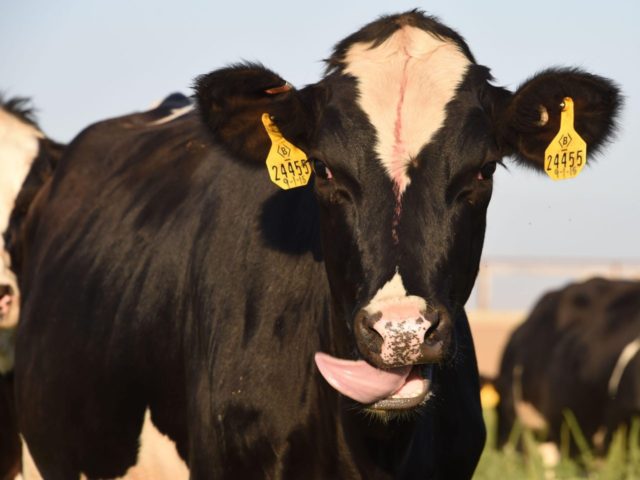30 percent of California dairies have closed and hundreds of thousands of milk cows have been slaughtered over the last decade. Meanwhile, California liberals are crediting themselves for reducing greenhouse gas emissions from farting cows.
When California’s Democrat-controlled legislature passed the California Global Warming Solutions Act of 2006, known as AB 32, few understood that the action was a financial attack on Republican rural agricultural communities that over the next decade would see 600 dairies forced to shut down.
Despite the higher energy costs for farming, processing, and transportation to comply with AB 32, California’s remaining 1,400 dairy families and their 1.74 million milk cows are still ranked first in the U.S. for milk, butter, ice cream, nonfat dry milk, and whey protein concentrate production, plus second in cheese production. With $9.3 billion of sales, about 20 percent of America’s total, the California dairy industry is the state’s largest agricultural activity, accounting for 2 percent of the state’s economy.
But in the “Fake News” parroted by the media in the run-up to the elections, Sacramento Democrats claimed they needed to pass radical legislation in September to combat the “14.5 percent human-induced greenhouse gas emissions” that a United Nations 2013 report claims is produced by livestock, “with modern beef and dairy production accounting for the bulk of it.”
The ‘Mitigation of Greenhouse Gas Emissions in Livestock Production’ report produced by the Food and Agriculture Organization of the U.N. in November 2013 states that enteric (intestines) produced methane (CH4) emissions from livestock may contribute 7 percent of worldwide greenhouse gasses. The report also praised the modern dairy activities seen in California as environmentally friendly, since “grain-fed beef has a lower environmental footprint than grass-fed beef systems,” and the “largest GHG emissions in a beef production system (about 80 percent of the total) occur in the cow-calf phase, when cows and their calves are consuming predominantly forage-based diets.”
In spite of the fact that in California dairy farmers exclusively feed their dairy cattle grain and only utilize mature females, Democrats and one Republican voted to pass SB 1383, which requires a 40 percent in livestock greenhouse gases below their 2013 levels by 2030. It also allows the Air Resources Board to regulate cow flatulence, if a practical technology exists to reduce it.
Although Gov. Brown said, “This bill curbs these dangerous pollutants and thereby protects public health and slows climate change,” two complex crony amendments were taken in the final hours that effectively barred the National Federation of Independent Business and small farmers from understanding the impacts of the changes to the bill and having a chance to voice their strong opposition.
The real goal of the legislation was to fund another wildly subsidized sustainable energy boondoggle, with $90 million in grants from the state’s cap-and-trade revenues that will likely fund investments by large corporate farmers in dairy digesters and waste disposal corporations for composters. Both will use methane from manure to generate energy sold to electrical utilities at super-premium prices.
Dairy farmers say the new regulations will drive up costs when they are already struggling with five years of drought, low milk prices, and rising labor costs. They are also concerned about a newly-signed law that will boost overtime pay for farmworkers.
Director of environmental services for Western United Dairymen Paul Sousa was quoted by the San Francisco Chronicle: “It just makes it more challenging. We’re continuing to lose dairies. Dairies are moving out of state to places where these costs don’t exist.” He said he expects more “complete dispersal” auctions to close dairies and slaughter their mature herds.

COMMENTS
Please let us know if you're having issues with commenting.